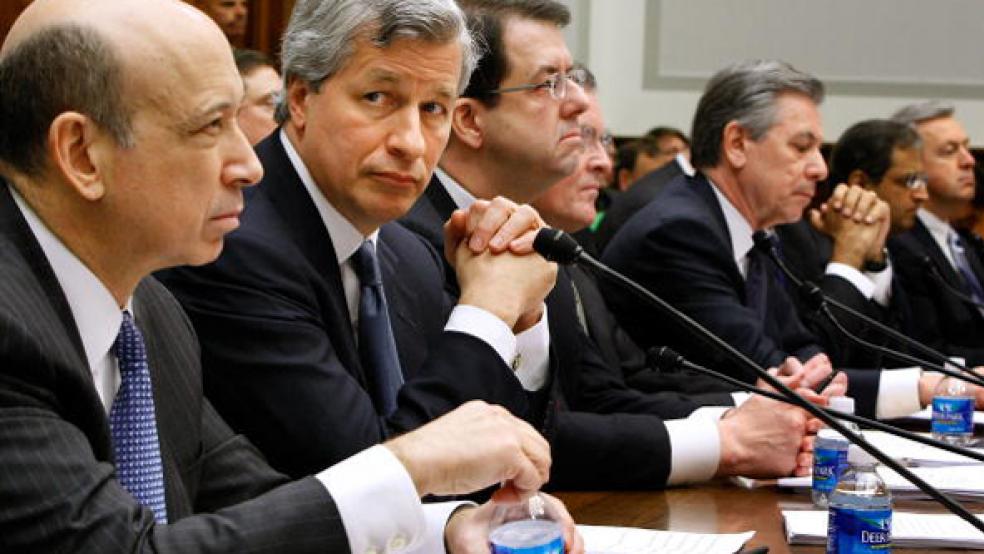Treasury Secretary Jack Lew on Thursday morning declared that in the future, when a systemically important bank or financial institution gets into trouble, there will be no taxpayer bailout and no heroic effort by regulators in Washington to save it.
Long-time industry observers think he’s wrong.
The idea that some banks are “too big to fail” – meaning that if they were allowed to collapse they would take the rest of the economy with them – has troubled policymakers for years. The Dodd-Frank financial reforms passed in 2010, after taxpayer-funded bailouts of banks during the financial crisis, made it a matter of law that public funds would no longer be used to save troubled banks.
RELATED: BREAK UP BIG BANKS? HERE'S A BETTER SOLUTION
In his speech, delivered at the Pew Charitable Trusts in Washington, Lew said, “tough rules are now in place to make sure banks have the capital to absorb their own losses; monitoring through stress tests is underway; and resolution authorities and plans are in place. There is a growing recognition of these changes, and market analysts are now factoring them into their assumptions.”
U.S financial services regulators, he assured listeners, have put in place new rules that mean “shareholders, creditors, and executives—not taxpayers—will be responsible if a large financial institution fails.”
The assessment from bankers, former regulators, and academics was not as positive.
“They are dreaming,” said Peter Wallison, a former Treasury Department general counsel who now serves as co-director of the American Enterprise Institute's program on financial policy studies
“What we had in the financial crisis was weakness among all the banks at the same time -- correlated risk. Dodd-Frank doesn’t even address correlated risk,” Wallison said. “If you think about what an administrator or government official is going to do in the future when we have something like what occurred in 2008, the only solution for the government at the time will be to prevent the failure of that large institution that will be the first of many.”
Camden Fine, president and CEO of the Independent Community Bankers of America, a trade group in Washington representing small banks, said, “I take his statement not with a grain of salt but with a block of salt.”
Fine continued, “Treasury secretaries, for several years prior to the recent crisis, would disavow that too big to fail even existed. They said it was just a myth. Then in 2008, we found out it wasn’t a myth.”
RELATED: 5 YEARS AFTER THE CRISIS: WHAT BANKS HAVEN'T LEARNED
In the future, Fine said, there’s little reason to expect anything different to happen.
“I can guarantee you that politics trumps policy every time and if we got into a true Fall of 2008 situation again, where a dozen of the nation’s very largest financial firms were collapsing, I guarantee you that whatever administration is in power would act to stabilize the system and I fear they would have to bail them out,” Fine said.
Fine said that the changes to the regulations under Dodd-Frank have had a positive effect on the safety of large banks. The requirement that banks hold more capital to guard against losses, to decrease leverage, and the upcoming finalization of a rule barring banks from making speculative investments all help, he said.
“But that does not necessarily end too big to fail. When you are dealing with a dozen banks that hold collectively $13 plus trillion of assets, that is going to become a political question,” he said.
Asked to comment on Lew’s speech, Cornelius Hurley, a professor with the Boston University Center for Finance Law and Policy who also worked as an associate general counsel at the Federal Reserve Board and as general counsel at a commercial bank, also disagreed with Lew.
Hurley said that large banks still appear to enjoy a significant discount to the rates at which they can borrow money in the markets relative to small banks.
“The market seems to have a high degree of confidence that Lew and [FDIC chairman Martin] Gruenberg and [presumptive Federal Reserve Board chair Janet] Yellen will do whatever it takes to assure the survival of one of the too big to fail banks if they get in trouble.”
On Lew’s speech, he said, ““I think he’s wrong.” - Follow Rob Garver on Twitter @rrgarver
Top Reads from The Fiscal Times:





